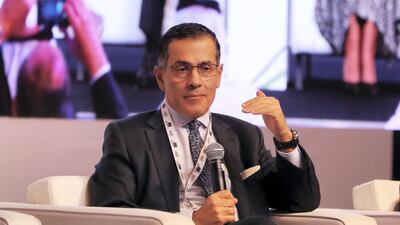The coronavirus pandemic could lead to a de-escalation in global armed conflict, foreign policy expert Vali Nasr said on Monday.
The academic was speaking with a senior Emirati diplomat at The Future of Diplomacy series, which investigates foreign policy in a world transformed by the outbreak.
More than 700 people from 32 countries joined the online discussion to hear both Mr Nasr, a leading authority on Shia Islam and US foreign policy, and Omar Ghobash, the Assistant Minister of Public and Cultural Diplomacy.
Mr Nasr, former dean at the Johns Hopkins School of Advanced International Studies in Washington DC, dealt with a range of topics, including the future of migration, conflict and what China-US relations meant for smaller states.
He initially argued that ongoing conflicts in the Middle East region could de-escalate as nation states looked to withdraw from expensive military engagements.
“That doesn’t mean they’re going to wash their hands of their interest in these arenas, but they may decide that right now putting another billion dollars into this conflict is not beneficial,” said Mr Nasr.
“Maybe there’s not an actual end to [war]...but what we might see is the conflicts being frozen, no more resources going into a knock-out win.
“Then we might begin to see some desire on the side of the parties to wind them down, even to begin de-escalating.”
The Future of Diplomacy series is hosted by the Office of Public and Cultural Diplomacy in the UAE.
The authority aims to strengthen the intellectual, cultural and humanitarian legacy of the country through national and regional initiatives.
In his address, Mr Nasr suggested existing social contracts between governments and their public would likely see a renegotiation in the wake of the pandemic as national priorities shifted.
He said the virus had the capacity to lead to numerous repercussions, including creating large waves of migration to Europe and within the Middle East, potentially leading to unanticipated conflict.
“Covid is such massive event in world history that it’s bound to be a geo-strategic reset, it’s bound to pivot certain countries in new directions,” he said.
“Every country now literally has to go back to the drawing board and not think about the world the way it was before Covid but begin to do scenario building about the possibilities of the future."
Mr Nasr also highlighted the current absence of cooperation between the US and China, leading to “an arms race” in technology.
He emphasised that future technologies, including those related to public health, could pressure small and medium-sized states like the UAE into taking sides.
“I think one of the bigger challenges down the road is if we end up in a place that begins to look a lot more like Cold War and if, on every international issue, how you vote becomes a measure of your loyalty, a ‘you’re with us or you’re against us’ mentality,” he said.
“That puts small and medium-sized countries in a place they don’t want to be. [They need] to resist this trend, so they have to band together."
Mr Nasr also argued that a recent, growing global trend in domestic populism could falter because of the virus.
He pointed out that because potential solutions to the pandemic - such as a successful vaccine - lay in science rather than rhetoric, more vocal, aggressive popularist movements may fail.
“I think where the populists fail is they really don’t have very strong technocrat answers for the problem,” he said.
“Covid is a problem that needs experts to solve it. It needs scientists, economists, capable technocrats to manage and solve it and that community is not part of populism.”
The next talk features Casper Klynge, a former Danish diplomat who served as the world’s first tech ambassador to Silicon Valley in California.
Mr Klynge is vice president of Microsoft's Office of European Government Affairs to the United Nations. The online discussion will be held on Thursday, May 28 at 9pm. Register here.

